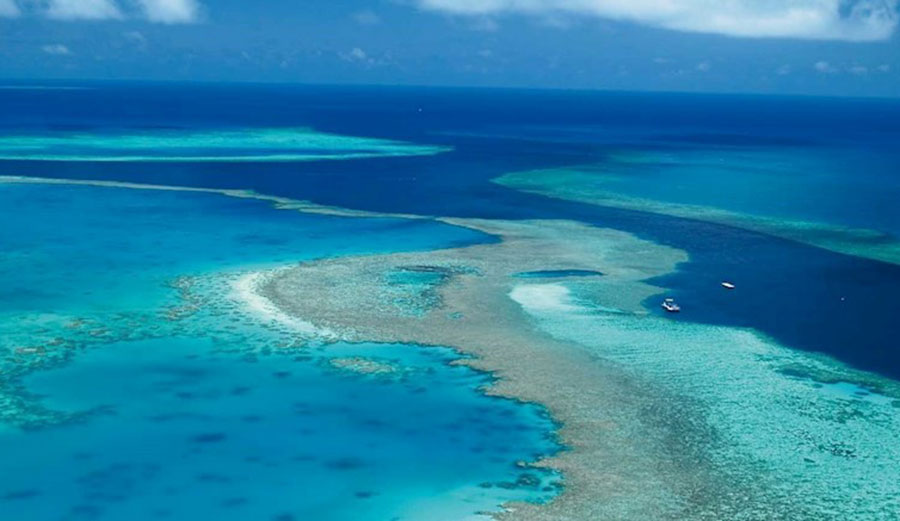
Experts say the current plan to save the Great Barrier Reef are is no longer achievable. Photo: Hamilton Island
Back in 2015, the Queensland government released something called the Reef 2050 Long Term Sustainability Plan. They did it because the Unesco World Heritage Centre let them know that they were considering adding the Great Barrier Reef to the list of world heritage sites that were under severe threat. Now, though, in a meeting of the Reef 2050 advisory committee, at least two groups of experts said the battle to “ensure the Great Barrier Reef continues to improve on its outstanding universal values” has already been lost.
“With climate change causing unprecedented back-to-back mass bleaching events in 2016 and 2017, killing almost half of the coral,” wrote Michael Slezak for The Guardian, “and with the risk of those events set to increase in the coming years, loss of coral cover and biodiversity was virtually assured.”
According to The Guardian, that means that the Great Barrier Reef will most likely be listed as a “world heritage site in danger.”
Coral bleaching isn’t always a disaster. In fact, it’s a relatively common phenomenon. As sea temperatures rise during warm spells, corals puke out the algae that give them their color. They turn white for a while, which is where the name “bleaching” comes from. Normally, the water cools down and the algae come back, but with three years straight of unprecedented levels of warming water, vast swathes of the Great Barrier Reef are staying bleached, which means, of course, that they’re dead.
“We’re seeing complete changes to ecosystems,” said Mark Eakin, Reef Watch coordinator for the NOAA. “If we’re losing over half of the corals in some of the best-protected places, and these events are becoming more frequent and severe, what does the future hold for coral reefs?”
During the Reef 2050 advisory meeting, where researchers provide advice to state and federal environment ministers on how they should approach the issue, the experts told the government panel that the declining overall health of the reef is a done deal. They did say, however, that a new plan should be implemented that could aim to maintain reef’s ecological function.
The importance of the Great Barrier Reef can’t be understated. Aside from the money it funnels into the Australian economy–economists recently valued it at $42.4 billion–it is home to an extensive amount of marine animals and is of huge importance in protecting Australia’s coastline.
Researchers say that we’re facing a depressing reality: conserving the reef in its current form is simply no longer possible. “The concept of ‘maintaining ecological function’ refers to the balance of ecological processes necessary for the reef ecosystem as a whole to persist,” said a spokeswoman for the Great Barrier Reef Marine Park Authority, “but perhaps in a different form, noting the composition and structure may differ from what is currently seen today.”
They’re not the only ones that say the reef is basically screwed, either. In a May 5th release from the Independent Expert Panel–another group that sits on the Reef 2050 committee–the prediction is similar. “There is great concern about the future of the reef, and the communities and businesses that depend on it,” they said. “But hope still remains for maintaining ecological function over the coming decades. Members agreed that in our lifetime and on our watch, substantial areas of the Great Barrier Reef and the surrounding ecosystems are experiencing major long-term damage which may be irreversible unless action is taken now.”
Both the Independent Expert Panel and the Great Barrier Reef Independent Review Group have one major bone to pick with the current iteration of the Reef 2050 plan: it doesn’t address climate change, which, according to them, is the main component of what’s affecting the reef.
“There’s a real risk that this new information will cause a renewed scrutiny for what Australia is or is not doing to protect the reef – particularly around climate change,” Brendan Sydes, a lawyer and CEO at Environmental Justice Australia, told The Guardian.
Although the results of the meeting of the Reef 2050 advisory committee are in, government officials aren’t willing to make any changes to the Reef 2050 plan. “The Turnbull government is firmly committed to protecting the Great Barrier Reef for future generations and delivering the Reef 2050 plan,” said federal environment minister Josh Frydenberg. “The government has been clear from the outset that the Paris Climate Agreement is the place to deal with climate change.”

